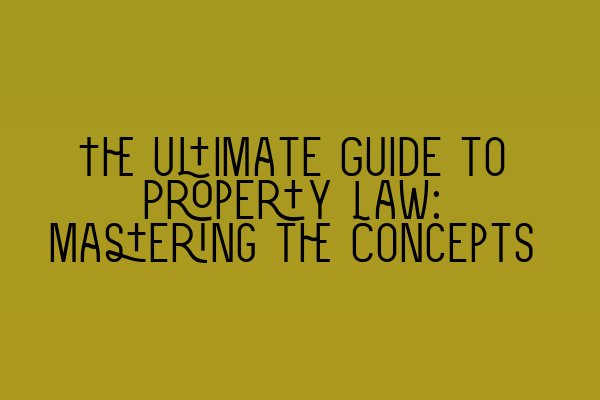The Ultimate Guide to Property Law: Mastering the Concepts
Welcome to the ultimate guide to property law, where we will take you through the fundamental concepts and principles that every solicitor needs to master. Whether you are a beginner or an experienced professional looking to refresh your knowledge, this comprehensive guide will provide you with all the information you need to excel in property law.
What is Property Law?
Property law governs the rights and obligations related to the ownership, possession, and use of real and personal property. It encompasses a wide range of legal issues, including buying and selling property, leasing, landlord-tenant disputes, easements, and more.
Understanding property law is essential for solicitors practicing in areas such as commercial and residential property, real estate transactions, land development, and property litigation. Mastery of the key concepts and principles is crucial for providing accurate and effective legal advice to clients.
The Key Concepts of Property Law
To effectively navigate property law, it is essential to grasp the core concepts that underpin this area of law. Here are some of the key concepts you need to master:
1. Ownership and Possession
Ownership refers to the legal right to possess, use, and dispose of property. While possession is the physical control and occupation of property. Understanding the distinction between ownership and possession is crucial in determining the rights and obligations of individuals in relation to property.
2. Estates and Interests
Estates and interests refer to the various forms of ownership and rights that individuals can have in land. These include freehold estates, leasehold estates, easements, restrictive covenants, and more. Understanding the different types of estates and interests is essential for advising clients on their rights and obligations regarding property.
3. Transfer of Property
The transfer of property involves the legal process of transferring ownership from one person or entity to another. This can be done through various means, including sale, gift, inheritance, or lease. Understanding the legal requirements and implications of property transfers is essential for ensuring a smooth and legally valid transaction.
4. Land Registration
Land registration is the process of recording ownership and interests in land in an official register. It provides certainty and protection for property owners and facilitates the smooth transfer of property. Understanding the land registration system and the legal requirements for registration is crucial for property solicitors.
The Role of a Property Solicitor
As a property solicitor, your role is to provide legal advice and assistance to clients on property-related matters. This may involve assisting clients in buying or selling property, negotiating leases, resolving disputes, conducting due diligence, and more. To excel in property law, you need a strong foundation in the key concepts and principles we discussed earlier.
In addition, a property solicitor should also have excellent communication and negotiation skills, as well as a keen eye for detail. Effective case management, research, and drafting skills are also crucial for providing high-quality legal services to clients.
Preparing for the SQE Exams
If you are pursuing a career in property law, you will need to pass the Solicitors Qualifying Examination (SQE) to become a qualified solicitor. The SQE consists of two stages: SQE1 and SQE2.
You can prepare for the SQE1 exam by taking practice exams and mocks, which will familiarize you with the format and content of the exam. It is also beneficial to enroll in SQE1 preparation courses to ensure you have a comprehensive understanding of the key topics.
Once you pass the SQE1 exam, you can proceed to the SQE2 exam, which focuses on the practical application of legal knowledge and skills. SQE2 preparation courses can help you develop the necessary skills and confidence to excel in this stage of the exam.
To stay updated on the latest SQE exam dates and registration deadlines, refer to the SRA SQE Exam Dates page on our website.
Conclusion
Property law plays a vital role in various legal matters, and as a solicitor, it is crucial to have a strong understanding of the key concepts and principles. By mastering property law, you can provide effective legal advice and representation to clients, whether they are buying or selling property, resolving disputes, or navigating complex legal transactions.
If you are preparing for the SQE exams, taking practice exams and enrolling in preparation courses will help you build the knowledge and skills necessary to succeed. Keep in mind that becoming proficient in property law requires continual learning and staying updated with the latest developments in this dynamic field.
For further practice and preparation, you can explore our additional resources:
- SQE 1 Practice Exam Questions
- SQE 1 Practice Mocks FLK1 FLK2
- SQE 2 Preparation Courses
- SQE 1 Preparation Courses
- SRA SQE Exam Dates
We wish you all the best in your journey to mastering property law and becoming a successful property solicitor.
